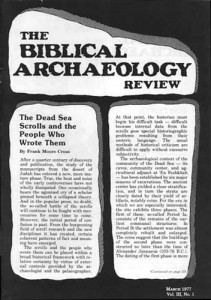Rainey on Ebla
To the Editor:
The supposed evidence for Yahweh names at Ebla is highly questionable. During Prof. Pettinato’s visit to the Department of Near Eastern Languages and Civilizations at Harvard University, it was pointed out by several of us that the -ya endings on personal names are simply shortened forms (hypocoristic) usually used for endearment and then becoming common usage. The names like Mika-il which become Mika-ya have nothing to do with Yahwism. The -ya element is simply a replacement for the Divine Name element.
The same phenomenon is known in many languages of the world. We have it in English. Note for example, Richard/Ricky, William/Willie, Peter/Petie, etc. The clearest case in point is, of course, Michael/Mickey which is an exact semantic parallel to the Ebla Mika-il/Mika-ya.
Therefore, it should be stressed that there is really no evidence in these Personal Names for the presence of Yahwism at Ebla. The finds at Tell Mardikh are magnificent and the excavator, Prof. Matthiae, and his colleague, Prof. Pettinato, are certainly to be congratulated. I am confident that they will do a splendid job of uncovering and of interpreting the Ebla finds. Their work has been truly exemplary thus far and will continue to be so.
On the other hand, there is no doubt that non-specialists will try to make use of the Ebla finds with varying degrees of accuracy. We are evidently in for a generation of “Ebla and the Bible,” just as we have suffered from “Nuzi and the Bible,” and from “Mari and the Bible.” Not that I am against the elucidation of Biblical studies by Near Eastern Studies; it’s just that too many people untrained in the original languages or too enthusiastic about the value of a “parallel”, tend to over dramatize the relevance of comparative evidence.
Already a library member? Log in here.
Institution user? Log in with your IP address.

